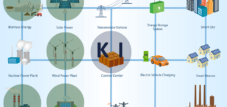Published on: June 16, 2025 / update from: June 16, 2025 - Author: Konrad Wolfenstein

Artificial intelligence | Marketing tactics of American companies with AI Angstmacherei-Image: Xpert.digital
The criticism of the AI Angstmacherei
Marketing tactics of American companies
Arthur Mensch, the 31-year-old French mathematician and co-founder of Mistral Ai, is considered Europe's greatest hope in the field of artificial intelligence. Born on July 17, 1992 in Sèvres near Paris, worked Mensch for three years at Deepmind, Google's Ki-Labor, before founding the company Mistral Ai together with Guillaume Lample and Timothée Lacroix.
The start-up has reached an evaluation of $ 6.2 billion at a remarkable speed and collected a total of around $ 1.2 billion in financing. Mistral Ai develops open source language models and positions itself as a European alternative to American AI giants like Openaai.
MenschA controversial thesis is represented: The widespread fear of artificial intelligence are targeted marketing strategies of American tech companies. He argues that CEOs use their warnings of AI risks to position themselves as the only trustworthy provider and to obtain regulatory advantages.
This view is supported by observations that the same companies that warn of AI dangers earn billions of AI technologies at the same time. The strategy could aim to eliminate smaller competitors through strict regulations that only large corporations can afford.
Suitable for:
The “messianic approach” of the Silicon Valley
MenschIn particular, criticizes the “messianic approach” of the Silicon Valley companies. These would try to develop AI systems that “are intelligent in every area and will replace us everywhere”. He refers to the concept of Artificial General Intelligence (AGI), which he basically doubts.
The Mistral CEO sees an attempt to “create God” in AGI-Rhetorics, and describes itself as a “strong atheist”, which therefore does not believe in AGI. These religious features of AI development are also discussed in research as problematic because they can lead to unrealistic expectations and fears.
Suitable for:
- From language models to AGI (General Artificial Intelligence) – The ambitious goal behind “Stargate”
The reality of AI technology
Control and autonomy
A central point of Mensch reasoning is that AI systems are not autonomous. The technology is under the control of those who have the corresponding technological know-how. This assessment is supported by current research, which shows that, despite its performance, AI systems still depend on human control and surveillance.
AI as a tool for increasing productivity
Menschsees AI systems primarily as tools to increase human productivity and creativity. Language models are today what search engines were in the 1990s - technologies that initially appeared incomprehensible, but became indispensable over time.
The educational offensive: AI for the next generation
Focus on schools and universities
Mistral AI invests significantly in education initiatives and works “a lot in schools, at universities”. This strategy reflects the knowledge that the 14-year-old already works “with AI anyway”. Studies show this development: 79 percent of British teenagers between the ages of 13 and 17 are already using generative AI tools.
In Germany, studies show that 57 percent of people aged 14 and over have had experience with generative AI. Educational institutions are increasingly developing AI-based learning assistants and integrating AI competencies into their curricula.
The generation Ki
Generation Z proves to be particularly open to AI technologies. While adults over 16 years are more reserved (31 percent use), young people naturally fall back on tools such as Chatgpt or Snapchats My AI. This development supports the thesis of the Arthur Mensch fact that AI technologies, like the Internet, were initially adopted by the younger generation in the 1990s.
Europe's position in the global AI competition
Challenges of EU regulation
Europe faces the challenge of reconciling innovative AI development with the strict AI Act. While some experts see regulation as a obstacle to development, others argue that they could give European companies a competitive advantage.
Mistral Ai benefits from France's supportive attitude towards open source AI development. The company has closed a partnership with Microsoft that gives it access to Azure infrastructure and opens up new commercial options.
Develop European alternatives
In addition to Mistral AI, other European AI companies such as Aleph Alpha from Germany or NXAI are developing, which show that Europe can keep up in the AI competition. However, experts are calling for significantly higher investments-up to 100 billion euros in the next ten years-to build their own European AI infrastructure.
Suitable for:
A pragmatic approach to AI development
The criticism of Arthur Mensch the “Ai-Aangstmacherei” raises important questions about the motivations behind public AI discourses. His emphasis on the practical applicability of AI technologies and the need to bring them closer to the next generation offers an alternative narrative to apocalyptic scenarios.
The development of Mistral Ai to one of the most valuable European start-ups shows that Europe is quite able to keep up in the global AI competition. It will be crucial whether European companies and regulatory authorities find a way to promote innovation without neglecting the legitimate security concerns.
Suitable for:
Your global marketing and business development partner
☑️ Our business language is English or German
☑️ NEW: Correspondence in your national language!
I would be happy to serve you and my team as a personal advisor.
You can contact me by filling out the contact form or simply call me on +49 89 89 674 804 (Munich) . My email address is: wolfenstein ∂ xpert.digital
I'm looking forward to our joint project.














